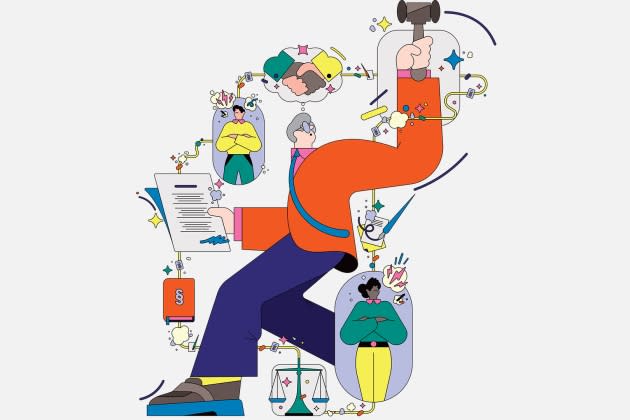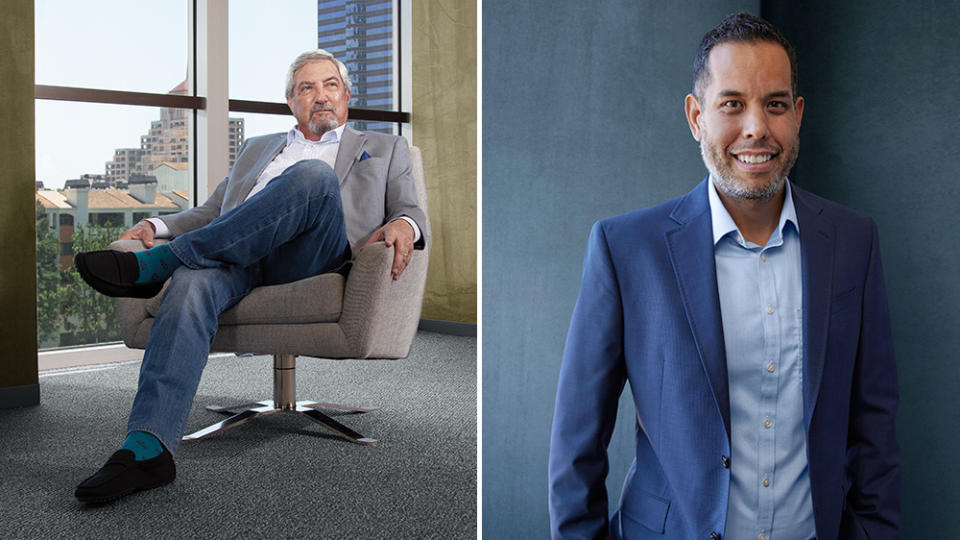How Mediation Helps Clashing Celebrities Avoid Costly and Embarrassing Public Litigation
- Oops!Something went wrong.Please try again later.
- Oops!Something went wrong.Please try again later.

For every publicly visible and contentious Johnny Depp v. Amber Heard trial, there are dozens more that never see the light of day.
More often than not, a showbiz lawsuit that begins with plaintiff and defendant slinging accusations back and forth in the headlines ends quietly with a below-the-fold story announcing that a confidential settlement has been reached. Yet, for those players who haven’t been through the process, what goes on behind the scenes remains something of mystery.
Such settlements are often achieved through third-party mediation, which, unlike arbitration, never mandates a binding decision. According to a survey of judges and attorneys published by the American Bar Assn. in December, 2020, mediation is the fairest way to resolve civil cases, followed by jury trials, bench trials and, lastly, arbitration. It’s also increasingly common.
The mediation process “is like shuttle diplomacy,” says Cheryl Snow, a partner at Gang, Tyre, Ramer, Brown & Passman. “They go from party to party and say, ‘well, maybe if you give a little bit here,’ and kind of coax the parties into an agreement.”
The leading player in these real-life dramas – and, ironically, the least well-known – is the person serving as the mediator, commonly referred to as a “neutral.” Although the Los Angeles Superior Court offers free mediation services for individuals and businesses, the high-stakes disputes that make the news are virtually all handled by private mediators supplied by organizations such as Signature Resolution, JAMS, Alternative Resolution Centers, Barron’s ADR Services and Judicate West.
Traditionally, the mediator role has been filled by retired judges and attorneys, but that is changing.
“Younger people have jumped into this industry, but you still need some gray hair to do this job,” says Dario Higuchi (below, right), founding partner and managing member of Signature Resolution. “It’s difficult for someone that’s not very experienced, who hasn’t lived through hundreds of cases, to be able to be convincing to a client and a lawyer.”
While attorneys are fierce advocates for their clients, and judges preside over their courtrooms with godlike powers, mediators are more like priests or rabbis who nudge litigants towards a mutually acceptable resolution, often by noting the metaphorical plagues that await them if they fail to settle.
“Everybody takes some incredible risk when they allow the case to go to trial,” says Dennis Ellis, a partner at Ellis George Cipollone O’Brien Annaguey. “Through mediation, the lawyer can make the determination of how the case resolves, and so can the client.”
For mediators working entertainment-related cases, the task is complicated by the fact that the litigants are accustomed to being treated like gods themselves.

“You have very strong personalities, whether they’re at the executive level or the talent level, so you’re dealing with people who commonly dominate the scene and the room, and they have to be convinced that their celebrity is not necessarily going to be a factor in a court setting,” says Louis Meisinger (above, left) of Signature, who spent more than 40 years as a litigator working in private practice, and as a general counsel for Disney, prior to a five-year stint as a Los Angeles Superior Court judge.
At the same time, the litigants need to be confident that the mediator is an agreeable and effective choice for both parties.
“You really want somebody that you think that is going to be receptive to your case, but you also want somebody that the other side is going to listen to,” says Devin McRae, a partner in the firm Early Sullivan Wright Gizer & McRae. “But it also depends on the case. If you’re defending what you feel is a shakedown, you’re going to want somebody that’s going to recognize a shakedown for what it is, or at least recognize when there’s merit and when there’s not.”
Private third-party mediation isn’t cheap. On the low end of the scale, California Arbitration & Mediation Services (CAMS) charges a minimum of $1,800 for one of its neutrals to mediate a civil case. The fee covers a half hour of prep time and the first four hours of mediation, with $450 charged for each subsequent hour. Mediators who handle big entertainment cases can charge anywhere between $15,000 and $35,000 a day.
For the neutrals, it’s more than about getting a big payday. Although most are effectively employed full-time, they are free to work when they please and take on only cases that interest them. It also gives them the luxury of time to do deep dives on a case’s complexities, thoroughly vetting contracts and other documents.
“With that clock ticking behind you on the bench all the time, you don’t necessarily have that [time] as a judge,” observes Scott Gordon, a Signature neutral who worked as a police officer before launching a legal career that included a stint as a deputy for Los Angeles County and 17 years as Los Angeles Superior Court judge.
While pricy, mediation is still a bargain when compared to the legal fees that can be incurred by a trial and subsequent appeals, which can stretch out for years. And the cost is not only monetary. A lengthy, public legal dispute can also cause reputational harm and exact an incalculable psychic toll.
“Even a straight commercial dispute can be very taxing on either litigant,” says Meisinger. “Many times, a company’s future is at risk. Even if it’s not, it’s still disruptive and invasive. And when you get into family law cases, the emotional cost is enormous.”
Since divorce actions involve highly private and often embarrassing aspects of people’s lives, the confidentiality of the mediation process is very attractive, and it’s exponentially more desirable when one or both of the parties involved are celebrities.
The vagaries of showbiz careers can present special challenges for mediators. When splitting assets and determining child support, it can be difficult to estimate future income from film and TV profit participation and music royalties, and custody is often complicated by swings in employment status, which can keep a parent at home for six months, then take them to a foreign country for an extended period.
“Sometimes people in matrimonial actions just need to be heard, even if what they’re saying doesn’t have a tremendous amount of legal weight, so to speak,” says Brett Ward, a partner at law firm Blank Rome, who specializes in matrimonial law, and who also works as a mediator. “And once they’ve told their side of the story to someone who has a sympathetic ear, then the person in my shoes says, ‘Okay, now here’s how I would apply the law to that.’”
Neutrals also have needs, and chief among them is getting litigants’ legal briefs and arguing their cases in a timely manner. Preferably, briefs are delivered a week in advance, but it’s not unusual for them to arrive in the early morning hours prior to the mediation conference.
“We all joke that when you come in in the morning, you listen to your clerk hit that date stamp [on the briefs] because people are filing things late,” says Gordon. “But, by and large, they are good about getting in early. Also, we have the flexibility to move the date to give you more time.”
On the day of the mediation, the plaintiffs and the defendants are sequestered in different rooms, from two to as many as seven or eight, depending on the number of parties involved in the case.
“I usually spend the first hour or two talking about principles that apply to litigation in general and then to the fact and the law of a particular case – so in my case it’s generally a couple of hours before I get the first demand from the plaintiff,” says Meisinger. “And then from that point, you negotiate with the parties. You’re trying to move the settlement needle toward someplace in common ground. Notice I didn’t say the midpoint.”
The offices of the firm providing the neutrals have traditionally served as the host, but during the pandemic, restrictions mandated that mediations be done remotely via teleconferencing services such as Zoom, and, while those restrictions have since lifted, remote mediation has remained a popular alternative to in-person meetings.
“In some ways, when people are doing this from their home or an office, they feel more secure emotionally as opposed to being in a third-party place,” says Gordon. “I find it a very effective tool. The camera sees everything, so you’re going to see it.”
Neutrals who handle showbiz-related cases typically have backgrounds in entertainment law or have worked in communities that bring them into frequent social contact with industry players. Although they have no legal obligation to disclose a potential conflict of interest, they usually do so anyway.
“The lawyers are pretty great about not caring,” says retired Los Angeles Superior Court judge Diane Wayne, a JAMS neutral with 26 years of mediation experience who estimates that roughly a third of her cases are entertainment-related. “I’ve never had them say ‘recuse yourself.’”
Ultimately, the nonbinding nature of mediation is both its most attractive feature and its most vexing bug. The process can stretch over multiple sessions spanning months, and still never reach a resolution.
“Sometimes cases are just not ripe for settlement,” says Meisinger. “But I think good mediators ultimately have a very high success rate. That’s why people pay a lot of money to engage in this process.”
Sign up for Variety’s Newsletter. For the latest news, follow us on Facebook, Twitter, and Instagram.

